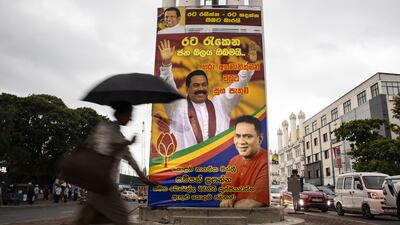Sri Lanka’s new prime minister Mahinda Rajapaksa, whose legitimacy remains unclear, said on Sunday that the election called for January to decide on the country’s true premier would go ahead, despite a legal challenge from the party of his ousted rival.
The former strongman, who served as Sri Lanka’s president from 2005 to 2015, said that he would “seek a mandate from the people” after President Maithripala Sirisena dissolved parliament late Friday, plunging the country into deeper political acrimony.
The elections are set for January 5, despite criticism from the United States and European Union member states. Ousted prime minister Ranil Wickremesinghe and his backers say they will also challenge the president’s decision at the country’s highest court.
"The election will go ahead and I am confident we will sweep the election," he said on Sunday in his first remarks since the polls were called.
"The international community must realise that this is democracy. They must understand our position. We are seeking a mandate from the people."
He said “no one” could prevent the vote from taking place. But the United National Party of Mr Wickremesinghe plans to put a stop to the election at the Supreme Court.
“We will go to the courts,” Mangala Samaraweera, finance minister for Mr Wickremesinghe, said on Saturday. “We will fight in the courts, we will fight in parliament and we will fight at the polls.”
_______________
Read more:
Sri Lanka's Tamils fear bloody return of 'Tiger killer' Mahinda Rajapaksa
Sri Lankan press freedom crushed following Mahinda Rajapaksa’s return
Inside Temple Trees: Prime minister’s bungalow becomes Sri Lanka’s seed of resistance
_______________
Mr Wickremesinghe insists he still heads the government and has refused to vacate the prime minister's official residence in Colombo.
Mr Sirisena dissolved parliament less than a week before the legislature was expected to vote on either Mr Rajapaksa or Mr Wickremesinghe.
Mr Sirisena's party had acknowledged that it did not have a majority in the 225-member assembly, despite arranging eight defections from Mr Wickremesinghe's party.
Only China has recognised Mr Rajapaksa's appointment as prime minister. The US expressed concern that Mr Sirisena was not adhering to the country’s constitution.
"The US is deeply concerned by news the Sri Lanka parliament will be dissolved, further deepening the political crisis," the US State Department said.
"As a committed partner of Sri Lanka, we believe democratic institutions and processes need to be respected to ensure stability and prosperity."
Election monitors have questioned the legality of the election, which comes nearly two years ahead of schedule.
The People's Action for Free and Fair Elections, one of two officially sanctioned election monitoring groups, said it believed Mr Sirisena's actions were unconstitutional.

